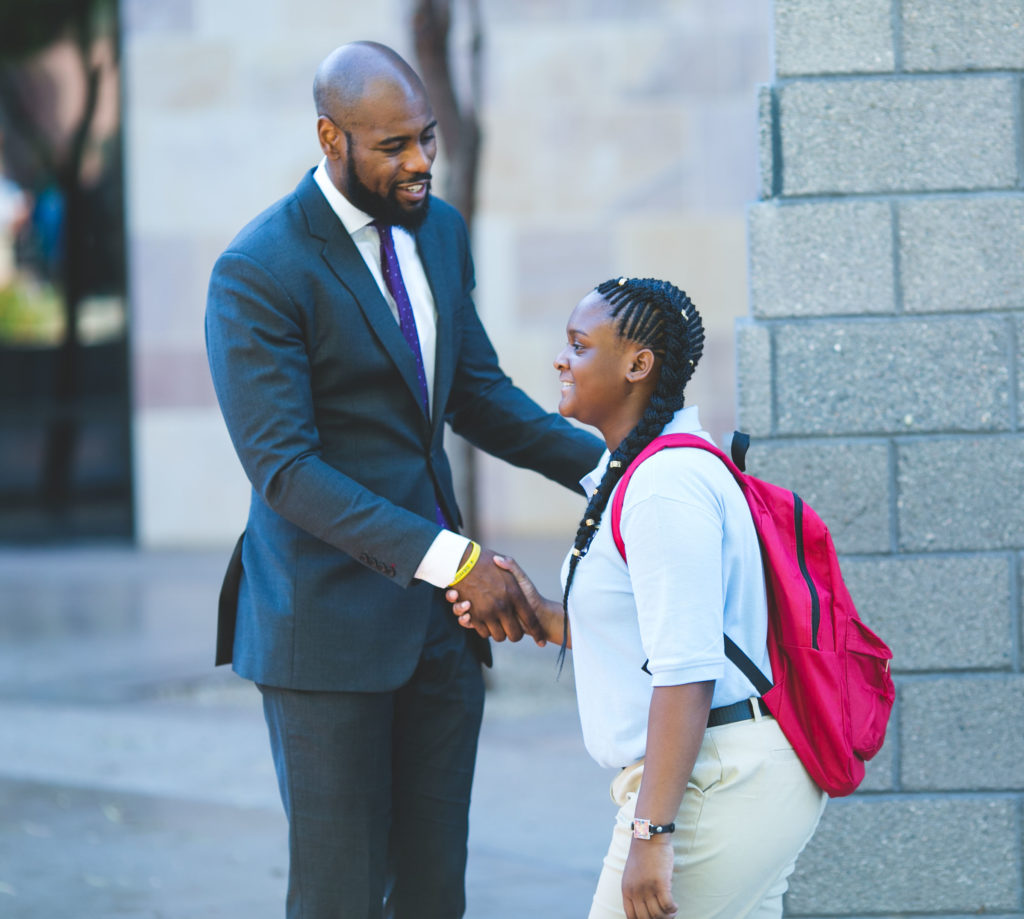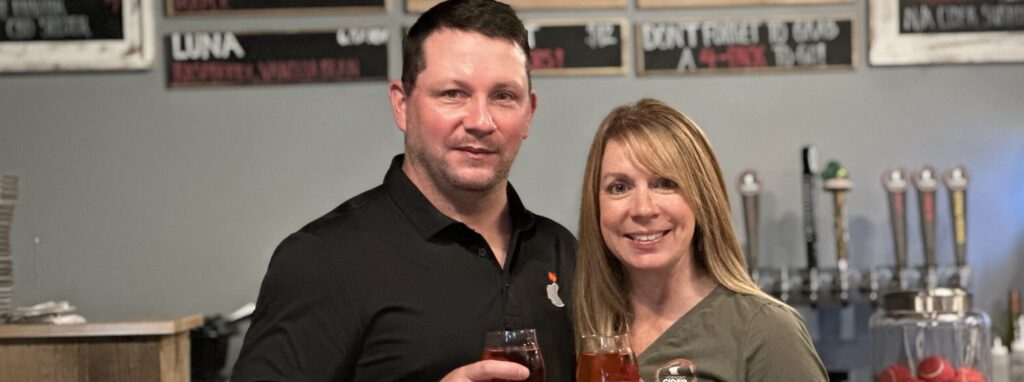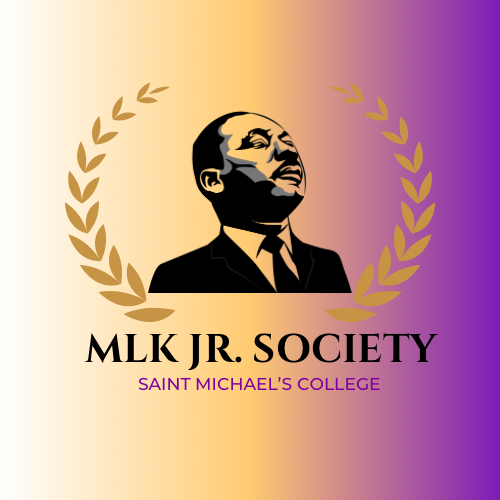When a change of heart led to a change of careers for Adam Johnson ’03, he turned to lessons from Saint Michael’s College and the liberal arts to bridge his transition confidently.
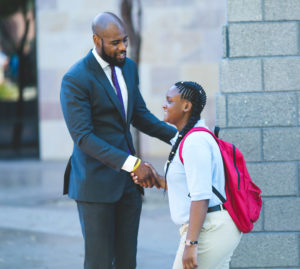
Adam Johnson ’03 greets a student at Democracy Prep charter school in Las Vegas where he is executive director.
The former varsity basketball player for the Purple Knights demonstrated increasingly strong social conscience and deep concern for kids through his community outreach work even while building early workplace success after Saint Michael’s with Grainger Industrial Supplies for eight years; then, during graduate MBA studies at George Washington University with the thought of entering corporate leadership, he felt pulled instead to education as his full-time calling.
Using connections through graduate school mentors, Johnson took various roles with Teach for America in the western U.S. starting in 2011 before, in 2016, becoming the executive director of the Democracy Prep/Agassi Campus charter school in Las Vegas. There today he works long but gratifying hours changing kids’ lives by giving them the sort of opportunities that he felt lucky to have early in his own life.
“I was born and raised in Washington, D.C. and in the middle of high school my parents ended up divorcing so I ended up moving down to Georgia to finish up high school and from there did a post-graduate year at Berkshire School in western Massachusetts where I learned about St. Mike’s after I was recruited by Tom O’Shea to play basketball with a full scholarship – I felt it was a great opportunity,” Johnson said. “I thought an Edmundite college was a good fit for me given my desire to serve and my love of community from an early age.”
Still, since his immediate priorities in those days were playing basketball and setting the stage for well-compensated career success, he chose accounting as a major and even accepted an accounting internship on campus in the business office — “and quickly realized that spending my days in an office building with just me and the computer was not going to be the thing that brought me a lot of joy.” Privately, he decided to finish the major but not make it his career, but when he left college, “teaching and education was not in my plan,” so he took a job managing several storefronts for Grainger and advanced there for several years before deciding to attend business school while still working, with an eye on an eventual corporate-level job.
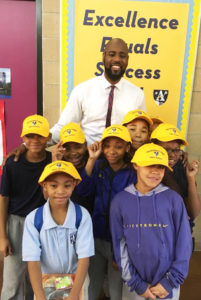
Adam Johnson with some younger students at his school.
Being “exposed to the concept and world of corporate social responsibility” during those graduate studies “really sparked an interest in what I wanted to do later,” Johnson said. His role with Grainger involved going into the community to support schools and residents in various ways, and he began thinking, “how can I help more people?” One grant that he gave out for a high school during this period made him think of education as a field more seriously.
“I was really fortunate to have gone to great schools with fantastic teachers, but I learned that was not a case for many students in my hometown of D.C., so that was the point I decided to transition into the nonprofit world,” he said. A business school mentor introduced him to a colleague involved with the organization Teach for America in the western U.S. – particularly, a project in Las Vegas that matched Johnson’s skills and passions. “I started working in development for Teach for America at first, and that evolved into a lot of different roles,” he said. “I got robust experience … which allowed me to see lots of facets of the education community here in Las Vegas and nationally, and that provided a great framework to dovetail into my next move in education – I ran for school board, and while I came up short, that experience led me to this opportunity at Democracy Prep as executive director.
Charter schools “are public schools that have the ability to create a curriculum based on specific values we believe,” he explained, “so at Democracy Prep it is college prep and civic engagement that we engage in all our course work.” Such schools have supporters and detractors: Some feel such specialized missions are not appropriate to public schools, while others like Johnson are ardent supporters of the unique opportunities they present. “Through service projects, we want our students to understand our democratic process, to see they have agency at any age and responsibility as a citizen to serve the community,” he said.
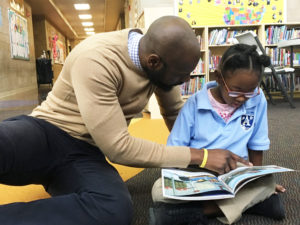
Adam Johnson gives a student some individualized mentoring with reading.
A lottery system fills spaces if enrollment rises too high, though Democracy Prep presently has 1,018, not quite at full capacity for K-12. “My driving force here in Vegas is knowing it’s important to provide children the opportunity to pursue a college education since that’s going to be so necessary in the 21st century economy,” he said. “I don’t want them only to be able to survive on hospitality and entertainment, which is the predominant industry here.”
Johnson values what St. Mike’s did to set him up for career success and change. “They do a great job of allowing you to reflect on what you want to do and how you’re going to be able to do it,” he said. “A liberal arts education from St. Mike’s really prepared me to go into a variety of fields and have the foundational skills of thinking, of writing, of analyzing — more than I would have gotten at a lot of places — and best of all was to have all that wrapped around a service component.” All those experiences directly apply to his work today, he said. At St. Mike’s he was a Big Brothers/Big Sisters mentor for a time, which awakened his early interest in working with youth; he also speaks glowingly of St. Mike’s professors who mentored, challenged and believed in him even if he struggled sometimes — particularly Reza Ramazani in economics.
Johnson also values how his Saint Michael’s classes stressed ethical questions and the importance of having a conscience in any endeavor. “I thought a lot about that afterward: how do we not sacrifice our humanity, even though we’re pushing forward to advance business and make our own way?” said Johnson, who stresses to his Democracy Prep mentees today the importance of “having grit and perseverance and pushing through,” which St. Mike’s professors and the wider community ingrained in him, he said.

Adam Johnson tries to get to know students personally in the course of his day.
He also tells his students today that writing skills are vital in any career, and for him, such skills were refined while at St. Mike’s. “In the liberal arts setting, I took history, English, religion, philosophy — all where I needed to expand the way that I wrote since you have to express yourself differently than you would in business — and that served me incredibly well when I moved into different fields” – for instance, the grant-writing he did at Teach for America.
Though loving his present work, someday Johnson hopes to find ways he might serve even more youth on a larger scale. “I got into education because I wanted to make a tangible impact on people’s lives, and I think too many children don’t get the opportunity they deserve — so I want to change that,” said Johnson, who lately has been asking himself, “How do I expand my impact?” That might mean running for political office to impact more students with policies, or working for national nonprofits that can ensure impacts on a larger scale. His goal “is to ensure more people are able to access the American Dream because they have the access and education and skills. Where that leads for me, I’m not sure, but that’s the outcome I want to see.”
Johnson’s most important advice for current college students based on his own experiences is to “figure out how you can network, because the most important thing after you get out is the ability to build connections and keep those warm and share with people in the field you’re interested in – then translate that into work you want to do, and stick to what is true to you.”
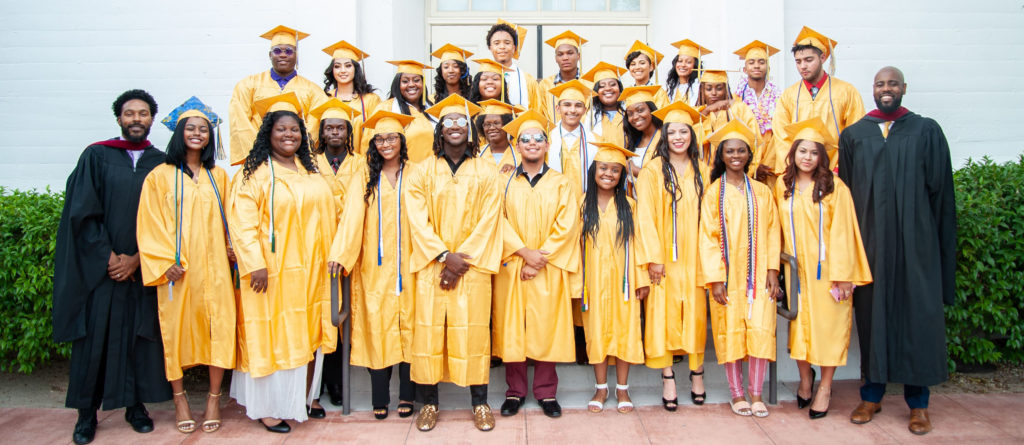
Adam Johnson stands at right with a group from a recent graduating class at Democracy Prep.

For all press inquiries contact Elizabeth Murray, Associate Director of Communications at Saint Michael's College.
